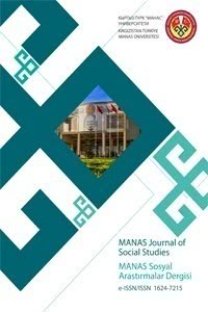OTEL HİZMETLERİNE DAİR KONUK BEKLENTİLERİNİN KANO MODELİ İLE SINIFLANDIRMASI VE ÖNCELİKLENDİRİLMESİ
CLASSIFICATION AND PRIORITIZING THE EXPECTATIONS OF GUEST ABOUT HOTEL SERVICES WITH THE KANO MODEL
___
- Ahmad, N. (2017). Quality Attribute and Customer Satisfaction: Using Kano's Model to Prioritize What Matters Most to Customers. Journal of Marketing and Consumer Behaviour in Emerging Markets, Vol.1(5),15-28.
- Akbaba, A. (2006). Measuring Service Quality in the Hotel İndustry: a Study in a Business Hotel in Turkey. International Journal of Hospitality Management, Vol.25(2), 170-192.
- Attallah, N. F. (2015). Evaluation of Perceived Service Quality Provided by Tourism Establishments in Egypt. Tourism and Hospitality Research, Vol.15(3), 149-160.
- Berger, C., Blauth, R., Boger, D., C.Bolster, G.Burchill, DuMouchel, W., et al. (1993). Kano's Methods for Understanding Customer Defined Quality. Center for Quality Management Journal, Vol.2(4),3-36.
- Chen, H. T., & Chen, B. T. (2015). Integrating Kano Model and SIPA Grid to Identify Key Service Attributes of Fast Food Restaurants. Journal of Quality Assurance in Pospitality & Tourism, V.16, 141-163.
- Choi, T., & Chu, R. (2001). Determinants of Hotel Guest's Satisfaction and Repeat Patronage in the Hong Kong Hotel Industry. Hospitality Management, Vol 20, 277-297.
- Cronin, J., & Taylor, S. (1992). Measuring Service Quality: A Reexamination an Extension. Journal of Marketing, V.56(3), 55-68.
- Demirbağ, Ş., & Çavdar, E. (2016). Üniversite Öğrencilerinin Akıllı Telefonlar ile ilgili Gereksinimlerinin Kano Modeli ile Analizi. Çankırı Karatekin Üniversitesi İ.İ.B. F. Dergisi, 1-28.
- Dominici, G., & Palumbo, F. (2013). The Drivers of Customer Satisfaction in the Hospitality Industry: Applying the Kano Model to Sicilian Hotels. Int.J. Leisure and Tourism Marketing, Vol.3, No.3,215-236.
- Ennew, C. T., & Binks, M. R. (1999). Impact of Participative Serive, Relationships on Quality, Satisfaction and Retention: An Exploratory Study. Journal of Business Research, (46), 121-132.
- Giritlioğlu, İ., & Korkmaz, H. (2016). Turizm Eğitimi Alan Üniversite Öğrencilerinin Turistik tüketici Kapsamıda Gece Kulüplerinden beklentilerinin Kano Modeli'ne Göre Sınıflandırılması. Anadolu Üniversitesi Sosyal Bilimler Dergisi, Cilt;14, Sayı; 4, 153-166.
- Gupta, P., & Srivastava, R. K. (2012). Analysis of Customer Satisfaction of the Hotel Industry in India Using Kano Model and QFD. International Journal of Research in Commerce, IT & Management, Vol2(1),74-81.
- Ho, L.-H., Peng, T.-F., Feng, S.-Y., & Yen, T.-M. (2013). Integration of Kano's Model and SERVQUAL for Enhancing Standard Hotel Customer Satisfaction. African Journal of business Management, Vol 7(23), 2257-2265.
- Hussain, A., & Mkpojiogu, E. O. (2017). Predicting the Perceived Worth of Software Product Requirements with CustomerSatisfaction. American Scientific Publishers, Vol.23, 4269-4273.
- Jang, H.-Y., Song, H., & Park, Y. T. (2012). Determining the Importance Values of Quality Attributes Using ASC. J Korean Soc Qual Manag, Vol.40, No.4, 589-598.
- Karakas, K. M. (2014). Importance and Impact of Guest Satısfaction. APSTRACT, Vol.8, Number 4.,31-37.
- Kleynhans, I., & Zhou, P. (2012). Service Quality at Selected Hotels in Pretoria, South Africa. African Journal of Business Management, Vol.6(45), 11342-11349.
- Kuo, C.-M., Chen, H.-T., & Boger, E. (2016). Implementing City Hotel Service Quality Enhancements: Integration of Kano and QFD Analytical Models. Journal of Hospitality Marketing and Management, (25),748-770.
- Kültür ve Turizm Müdürlüğü. (2017). Turizm Belgeli Oteller. Konya: Kültür ve Turizm Bakanlığı Konya Kültür ve Turizm Müdürlüğü.
- Lee, Y.-K., Jeong, Y.-K., & Choi, J. (2014). Service Quality, Relationship Outcomes and Membership Types in the Hotel Industry: A Survey in Korea. Asia Pacific Journal of Tourism Research, Vol.19, No. 3, 300-324.
- Liat, C. B., Mansori, S., & Huei, C. T. (2014). The Associations Between Service Quality, Corporate Image, Customer Satisfaction and Loyalty: Evidence from the Malaysian Hotel Industury. Journal of Hospitality Marketing and Management, Vol.23(3), 314-326.
- Markovic, S., & Jankovic, S. R. (2013). ExPloring the Relationship Between Servcie Quality and Customer Satisfaction in Croatian Hotel Industry. Tourism and Hospitality Management, Vol.19,No.2, 149-164.
- Matzler, K., Hinterhuber, H. H., Bailom, F., & Sauerwein, E. (1996). How to Delight Your Customers. Journal of Product & Brand Management, Vol.5, No.2, 6-18.
- Reichheld, F. F., & Sasser, W. E. (1990). Zero Defections. Quality Comes to Services. Harvard Business Review, (68), 105-111.
- Sim, J., Mak, B., & Jones, D. (2006). A Model of Customer Satisfaction and Retention for Hotels. Journal of Quality Assurance in Hospitality and Tourism, Vol.7. No. 3,1-23.
- Wang, T., & Ji, P. (2010). Understanding Customer Needs Through Quantitative Analysis of Kano's Model. International Journal of Quality & Reliability Management, Vol.27, Issue:2, 173-184.
- Yang, C.-C. (2007). The Refined Kano's Model and Its Application. Total Quality Management&Business excellence, Vol.16, No. 10, 1127-1137.
- YİGM. (2017). 2016 yılı Turizm İşletme Belgeli Konaklama İstatistik Bülteni. Ankara: Kültür ve Turizm Bakanlığı.
- ISSN: 1694-7215
- Yayın Aralığı: Yılda 4 Sayı
- Başlangıç: 2001
- Yayıncı: KIRGIZİSTAN-TÜRKİYE MANAS ÜNİVERSİTESİ
BİR SÖZLÜ TARİH METNİ OLARAK KISSA-İ ZELZELE VE KONUSUNUN ANADOLU BASININA YANSIMASI
DİN ÖĞRETİMİ TEMELLERİ: KIRGIZİSTAN ÖRNEĞİ
TÜKETİCİLERİN RASYONEL VE HEDONİK MARKA ALGILARININ MÜŞTERİ BAĞLILIĞI ÜZERİNDEKİ ETKİSİ
TÜRKİYE'DE KENTSEL KATI ATIK YÖNETİMİ: KARŞILAŞTIRMALI BİR ANALİZ
SEVCAN GÜLEÇ SOLAK, ŞERİFE PEKKÜÇÜKŞEN
TÜRK, KIRGIZ VE RUS EBEVEYNLERİN ÇOCUK YETİŞTİRME TUTUMLARI: KÜLTÜRLER ARASI KARŞILAŞTIRMA
PEYZAJ TASARIMINDA ETİK VE SORUMLULUK
REDEFINING DIPLOMACY IN THE 21ST CENTURY & EXAMINING THE CHARACTERISTICS OF AN IDEAL DIPLOMAT
Metin AKSOY, Ahmet Servet ÇİÇEK
MUTFAK ŞEFLERİNİN TEKNOLOJİYE HAZIR BULUNUŞLUK (TRI) DURUMLARININ DEĞERLENDİRİLMESİ
TÜRKİYE ve BATI ÜLKELERİNDE YÜKSEK DİN ÖĞRETİMİ: NİTELİKSEL BİR KARŞILAŞTIRMA
ÜNLÜ KIRGIZ ELEŞTİRMEN SALİCAN CİGİTOV'UN İLMÎ KİŞİLİĞİ VE MAKALELERİNE BİR BAKIŞ
